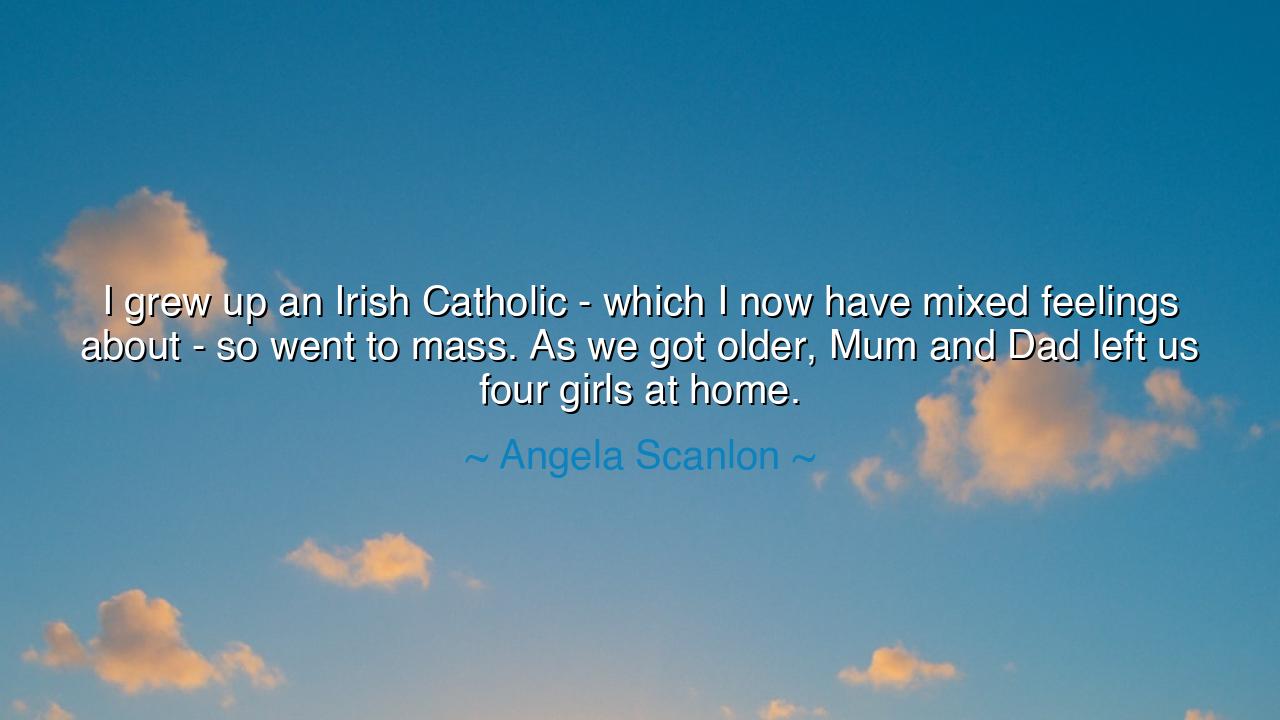
I grew up an Irish Catholic - which I now have mixed feelings
I grew up an Irish Catholic - which I now have mixed feelings about - so went to mass. As we got older, Mum and Dad left us four girls at home.






"I grew up an Irish Catholic — which I now have mixed feelings about — so went to mass. As we got older, Mum and Dad left us four girls at home." Thus spoke Angela Scanlon, a voice of both honesty and affection, reflecting upon the contradictions of faith, family, and growing up. In this simple remembrance lies something far deeper than memory: it is the story of inheritance, of the soul’s journey from the innocence of childhood to the questioning of maturity. Hers are not words of rebellion, but of reflection — a tender acknowledgment of the world that shaped her, and of the distance she has walked since.
To be raised in the heart of Irish Catholic tradition is to grow amidst ritual and reverence, in a culture where faith and identity intertwine like threads of the same cloth. For centuries, the Church was not merely a belief system but a rhythm of life — the sound of bells in the morning, the smell of incense, the bowing of heads in unison. Children like Angela were taught not just what to think, but how to belong. Yet as the years pass, the soul begins to wrestle with what it has inherited. The child who once followed with pure trust grows into an adult who questions, who seeks not only tradition but truth.
When she says she has “mixed feelings,” it is the voice of one who loves where she came from, yet feels the weight of its expectations. Such ambivalence is the hallmark of growth. To question what once guided you is not to reject it, but to seek a deeper understanding. Every generation must wrestle with the faith of its fathers — not out of disrespect, but out of the sacred duty to make that faith its own. The heart that doubts is not lost; it is alive, still searching for a home that feels honest.
The image of her parents leaving the four daughters at home speaks, too, of the quiet passing of eras — how traditions fade not through rebellion, but through the soft erosion of time. Once, the family marched together to church, a symbol of unity and belief. But as the children grew, the parents stepped back, perhaps knowing that each soul must find its own path. In that act lies a subtle grace — the acceptance that love does not demand uniformity, that true faith, like true family, allows freedom to differ.
History holds many such moments of transformation. In the days of Galileo, the Church clung to old understandings of the cosmos, and yet it was through his questioning — painful, controversial, and true — that humanity moved forward. In him, as in countless others, the tension between devotion and doubt became the crucible of progress. So too does Angela’s reflection echo that timeless struggle: between the comfort of belief and the courage of inquiry. To question one’s origins is not to abandon them; it is to bring them into the light and ask, “What part of this is mine to keep, and what part must I release?”
Her story is, therefore, not only personal but universal. We are all, in our own way, children of something — a culture, a faith, a tradition — that shaped us before we could choose. And as we grow, we must return to those roots, not to dwell there, but to understand them. We must look with both gratitude and discernment, seeing both the beauty and the burden, the comfort and the constraint. To do so is the work of a mature soul, one who honors the past without becoming bound by it.
So, my child, take this wisdom to heart: you are the heir of your beginnings, but not their prisoner. Remember what shaped you, but do not let it define you beyond your choosing. Whether your heritage be of faith, family, or culture, treat it with reverence — not blind devotion, but with the open eyes of understanding. There is no shame in having mixed feelings; there is only depth. For the one who can look at their past with both love and honesty walks the truest path — the path of a soul that is both rooted and free.
And when you, too, think of your childhood — of your parents, your rituals, your first beliefs — do not scorn them for being imperfect. Instead, see in them the soil from which you rose. Faith evolves, love endures, and wisdom begins where questioning meets gratitude. That is the lesson hidden in Angela Scanlon’s reflection — that we grow not by rejecting where we came from, but by understanding it deeply enough to walk forward in truth.






AAdministratorAdministrator
Welcome, honored guests. Please leave a comment, we will respond soon